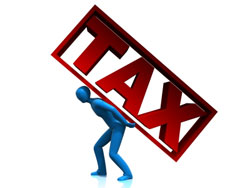Although a “straight” Chapter 7 bankruptcy case can allow you to write off some income taxes, if you owe a lot of recent tax or multiple years of taxes, Chapter 13 is often the best option.
Chapter 13 vs. Chapter 7 Bankruptcy with Income Taxes
 Chapter 13 bankruptcy is a court-approved payment program that usually takes three to five years to successfully complete. While at first glance being in a payment program doesn’t look nearly as good as simply discharging (legally writing off) your debts in a Chapter 7 case, the fact is that some debts can’t be discharged under Chapter 7 bankruptcy. In many circumstances, federal income taxes cannot be written off. Our recent blog entitled “Can Income Taxes Be Discharged — Written Off — Or Not?” lays out the four main conditions that must be met to discharge an income tax debt through Chapter 7. If all or most of your income tax debts can be discharged under Chapter 7 by meeting those four conditions, you will not need the extra benefits of Chapter 13.
Chapter 13 bankruptcy is a court-approved payment program that usually takes three to five years to successfully complete. While at first glance being in a payment program doesn’t look nearly as good as simply discharging (legally writing off) your debts in a Chapter 7 case, the fact is that some debts can’t be discharged under Chapter 7 bankruptcy. In many circumstances, federal income taxes cannot be written off. Our recent blog entitled “Can Income Taxes Be Discharged — Written Off — Or Not?” lays out the four main conditions that must be met to discharge an income tax debt through Chapter 7. If all or most of your income tax debts can be discharged under Chapter 7 by meeting those four conditions, you will not need the extra benefits of Chapter 13.
How Chapter 13 Handles Income Taxes
But if you owe a lot of taxes that can’t be discharged, or you owe both taxes that can be discharged but also some that can’t, Chapter 13 does the following:
1) If you do have any taxes that would have been discharged under Chapter 7, these are grouped together with all your ordinary, so-called “general unsecured” debts, like medical bills and credit cards. These types of debts are paid off only if you have available “disposable income” to do so and only after other, higher priority debts are paid. This means that often only a small portion of what you owe in this category of taxes is paid, and sometimes nothing is. And quite often, if you are paying a portion of your “general unsecured” debts, you are paying a set amount of money to this group of creditors as a whole. This means that your taxes in this category often do not add a penny to the total amount you must pay; they just reduce the amount your other “general unsecured” creditors receive.
2) Those taxes that would not have been discharged under Chapter 7 bankruptcy are also not discharged under Chapter 13. They are called “priority” debts and must be paid in full during the course of your Chapter 13 case. But this comes with the following advantages:
a) The terms of payment to the Internal Revenue Service under Chapter 13 are based on your actual ability to pay instead of the IRS’s usual aggressive collection standards.
b) Penalties that were added to the tax before you filed for Chapter 13 — which can be a significant part of the tax debt — are not considered “priority” debts but rather “general unsecured” debts and so are not paid in full, but rather as described above.
c) Usually interest or penalties stop accruing as soon as your Chapter 13 case is filed, so your balance is not constantly increasing, enabling you to pay off the tax faster.
d) During your entire Chapter 13 case, you are protected from the collection efforts of the Internal Revenue Service, so you don’t have to worry about garnishments of your paycheck or bank accounts, tax liens or any of the other aggressive methods the IRS would usually have at its disposal.
e) Because you are protected from the IRS, and because usually interest and penalties are not accruing, you have the flexibility to pay other, even more pressing creditors in your Chapter 13 plan ahead of or alongside the IRS, such as child support back payments or a vehicle loan arrearage.
Also, since “priority” taxes are paid in a Chapter 13 case before and instead of “general unsecured” debts, this often means that your “priority” taxes simply reduce the amount of money that would otherwise have gone to the “general unsecured” creditors. Under these circumstances, your tax debt would not increase the amount that you would have had to pay in a Chapter 13 case. Talk to your attorney to find out if this aspect would apply to you.
Regardless of whether some or all of these benefits apply to your situation, if you do have a large amount of “priority tax,” Chapter 13 will usually make dealing with your taxes much more manageable.
If you owe taxes and are considering bankruptcy, there is no question that you should get solid legal advice. So if you are in the Dallas-Fort Worth metroplex, let us help you through this often complex area. Schedule a no-obligation, free, confidential consultation with us either by calling 1-800-518-3328 or contacting us here .








Speak Your Mind